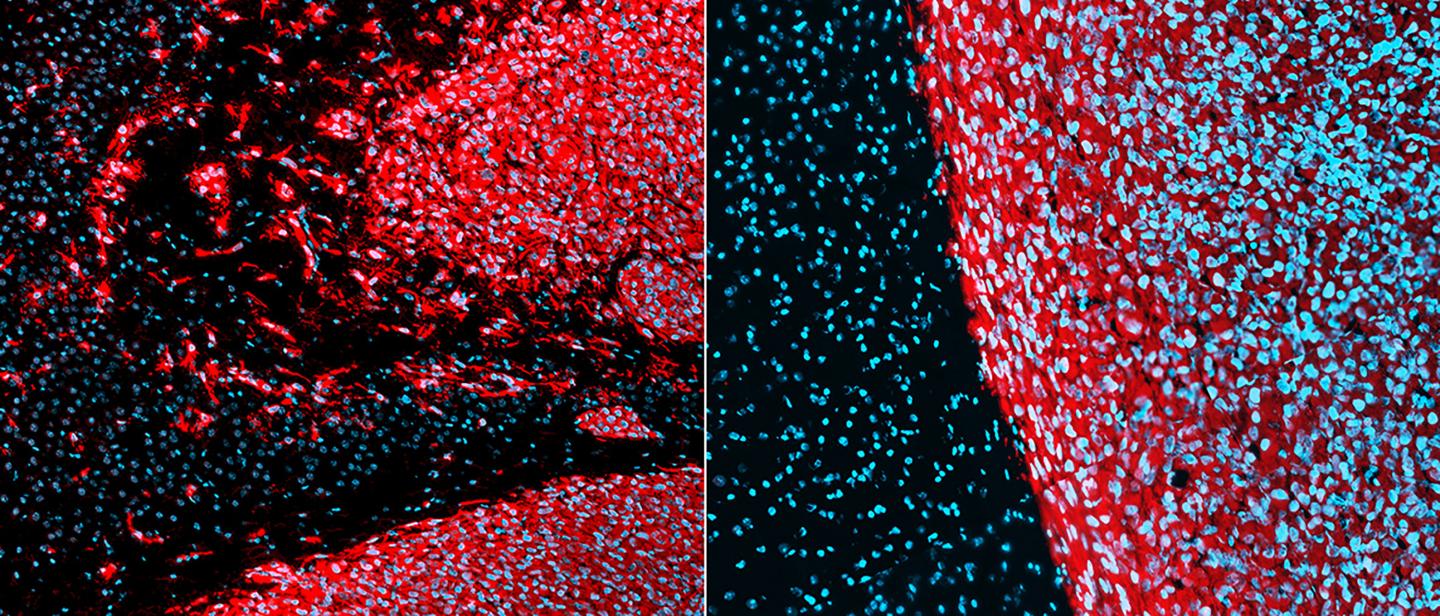Could antihistamine be a potential aid in defeating cancerous cells?

Credit: Laakkonen Lab / University of Helsinki
Glioblastoma is the most prevalent and also the most lethal type of brain tumour in adults, with no curative treatment currently available. Glioblastomas cannot be surgically completely excised, as the tumour cells are adept at invading tissues and spreading around the brain. In addition, glioblastoma cells are extremely resistant to existing drug therapies.
For a long time, researchers have been looking for weaknesses in glioblastoma cells which could be targeted with efficacious therapies.
A research group headed by Professor Pirjo Laakkonen at the University of Helsinki has already earlier found that the expression of a small fatty acid-binding protein (MDGI, or FABP3) in glioblastoma cells increases their ability to invade tissues and is linked with a poorer prognosis for the patient.
“Our new research revealed that glioblastoma cells depend on the expression of a gene which produces the MDGI protein. Inhibiting the function of this gene results in the death of the tumour cells,” Laakkonen explains.
The absence of MDGI caused instability in the membranes of lysosomes, cleaning organelles found inside tumour cells, which, in turn, resulted in the leakage of acidic and proteolytic enzymes contained in the lysosomes into the cytoplasm, initiating cell death.
Further investigations of the mechanism leading to cell death revealed that silencing MDGI caused changes in the phospholipid composition of the lysosomes in glioblastoma cells. The transport of linoleic acid, a substance essential to humans found in food, from outside to inside cells was disturbed, resulting in a significant change to the fatty acid composition of the lysosomal membrane. This change apparently increased the permeability of the membrane.
“Our research demonstrates that MDGI is a key factor regulating and maintaining the structure of the lysosomal membrane. This is the first gene found to regulate the stability of the membrane,” Laakkonen says.
What makes this finding particularly interesting is that cell death caused by leakage in the lysosomes of glioblastoma cells can be activated by using drugs that cross the blood-brain barrier. In their studies, Laakkonen’s group used an antihistamine known as clemastine.
In cell cultures, clemastine resulted in lysosome-mediated cell death in glioblastoma cells already at concentrations which had no significant effect on healthy cells of different types. In mouse models, clemastine was very effective in reducing the spread of brain tumours and improving the survival rate of the animals. In the case of the most invasive brain tumour model, the administration of clemastine resulted in the disappearance of the entire tumour.
“Our findings demonstrate that antihistamines and other drugs that increase the permeability of the lysosomal membrane can be considered as an enhancing therapy for patients with glioblastoma alongside established treatments,” Laakkonen says.
The study was published in the distinguished EMBO Molecular Medicine journal.
###
Reference: Vadim Le Joncour*, Pauliina Filppu*, Maija Hyvönen, Pauliina S. Turunen, Harri Sihto, Isabel Burghardt, Heikki Joensuu,Olli Tynninen, Juha Jääskeläinen, Michael Weller, Kaisa Lehti and Pirjo Laakkonen. Vulnerability of invasive glioma cells to lysosomal membrane instabilisation. EMBO Molecular Medicine (2019) e9034. DOI 10.15252/emmm.201809034 (*These authors contributed equally to this work)
Media Contact
Pirjo Laakkonen
[email protected]
Original Source
https:/
Related Journal Article
http://dx.




